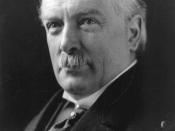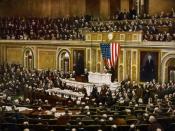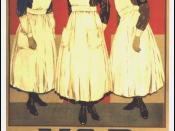World War One was a time of death, destruction and was in general a conflict of monumental proportions. However, as the cliché goes, there is a silver lining to every storm cloud. In the case of the Great War, the silver lining refers to the great leaps forward made in women's empowerment and involvement in society because of the advent of the war, which forced them into positions previously never considered by either gender. World War One provided women with the perfect opportunity to demonstrate to a male-dominated society that females were there for more than simply domestic chores, and this proved to be beneficial for both women and men alike. Women became involved in the army on the frontlines, were nurses and medical aids, played instrumental roles in keeping their nations' transport systems running, began to work in factories and buoyed the economy, and participated in significant organisations such as the Women's Land Army. Because of World War One, women became much more important in society and women's empowerment reached whole new levels.
One of the most obvious forms in which women asserted their importance was joining the army and Navy on the frontlines. Unprecedented numbers of women enlisted in the army and Navy. One of the forerunning nations that came to accept the use of women in the military was the US. The Navy and the Marine Corps were more accessible for women, as the Army was first attempting to work its way around bureaucratic red tape, and for this reason nearly 13,000 women were admitted into the Navy and Marine Corps with the same status as men (Wilson). This equality in uniform was the first step in women's empowerment, as women proved themselves in the eyes of the men as they fought alongside them. World War One especially created this opportunity as there was a dearth of soldiers, and every able-bodied person was considered an asset to the military in these times of war. However, the irony occurs in the form that women served their nation in a militaristic capacity even before they were allowed to vote, so it can be surmised that their service in the army paved the way for women's rights politically as well. In the US especially, it was the service of women in the military that pushed the passing of the 19th amendment (Wilson). President Woodrow Wilson supported the side of the women's suffragists, and clarified his position strongly with his statement, "We have made partners of the women in this war; shall we admit them only to a partnership of suffering and sacrifice and toil and not to a partnership of privilege and right?" when addressing his House to encourage them to pass the amendment. For the men in society, the numbers of women in the military swelled their ranks, which was the aim of the governments enlisting women in the first place. World War One opened up the military for women, and allowed them to prove themselves equal to men in a predominantly male setting.
Nursing and acting as medical aids have been regular job descriptions for women throughout history, but during World War One especially women commanded enormous respect when they took these roles to become part of the war. Young women volunteered to join forces such as the VAD's (Voluntary Aid Detachment) and FANY's (First Aid Nursing Yeomanry) (Wilson). The conditions were terrible and the job undesirable, yet women recognised the importance of their work, which included basic medical treatment on the frontlines of the actual fighting. Over 30,000 women served in the Army and Navy Nurse Corps of the US, and a similar number served in Europe (Wilson). These women were not even given a salary, adding to their image of bravery and patriotism. Although it can be said that World War One did not heighten women's empowerment in the sense that they should be "worshiped" for fulfilling their role as nurses--as nursing has always been a woman's job-- this view is untrue as World War 1 represented a time where women in this capacity were given formal recognition and awards signifying their achievements and service to their country. Women were presented with prestigious awards including the Distinguished Service Cross, the Distinguished Service Medal, and the French Croix de Guerre (Wilson). As women were finally recognised for their contributions as nurses and medical aids, they were provided with a sense of importance and their position in society was elevated. Without the women who courageously partook in these organisations, the casualty rates would have been much higher, so the services that these women provided were undeniably invaluable. Because women played such an instrumental role in World War 1, the war became a time when women's roles that were previously thought to be mundane were finally acknowledged and respected, bringing a whole new level to women's empowerment.
Although women were actively participating in the military itself, their involvement in the civilian workforce was just as equality asserting and significant, especially when women began to take on roles such as running their countries' transport systems. During the advent of war, the need for transport increased exponentially, as supplies, personnel, and other war-related equipment were in higher demand. With the men enlisted in the army, there was no choice but for the women to take over these professions, including working on the rail and tram lines and driving trucks, cranes, cars, and motorbikes for the war. Women found this "thrilling" (Goldstein), as this was an experience that none had encountered before and was a far cry from the domestic drudgery that they previously had to work at. The sense of release, which many women felt, fuelled women's empowerment as they fought for their rights. One woman described it as "like being let out of a cage," (Goldstein), and this optimistic reaction from many women demonstrated World War One's positive impact on women's empowerment. Women were depended on in ways never seen before, and society in general became indebted to the role women played during wartime.
One of the most important ways in which women were considered imperative in society's functioning during World War 1 included their involvement in factories, specifically munitions factories. Countries such as Britain and the United States mobilised thousands of women into war-related industries to make available men who previously held those positions into going to war. Women filled many jobs that suddenly became open because of wartime needs. Overall, the number of women employed increased from 3,224,600 in July, 1914 to 4,814,600 in January 1918. Nearly 200,000 women were employed in government departments, with half a million becoming clerical workers in private offices. The greatest statistical increase was in engineering; where there were 212,000 women working in munitions in the beginning of the war, by the end it had increased to 950,000 working in the highly dangerous munitions industry where they were asked to do heavy work such as unloading coal, stoking furnaces and building ships, as well as create actual munitions (Goldstein). David Lloyd George encouraged the passing of the Munitions War Act, which gave the government control over the industry. He directed thousands of women towards the munitions industry. These women became known as "Munitionettes". Although women's wage was significantly lower than the men's wages, after much deliberation it was agreed to raise women's wages, even though they were still ridiculously lower than the men's wages. But women's war work paid better than their regular domestic duties, and compared with domestic work, war work "offered escape from jobs of badly paid drudgery."(Goldstein). However it is unreasonable and idealistic to expect such drastic changes in such a short period of time, so the simple fact that there was discussion and consensus by authorities to improve women's rights speaks volumes for the leaps that women's empowerment had. The highly important work that women did in the munitions industries during the war contributed immeasurably to their campaign for voting rights, where they reminded society of their service to persuade them of their right to vote. All the work done by women during the war lead to women over 30 being able to vote in 1918 (Goldstein), which is testament to the fact that as soon as the war ended, women's empowerment had more momentum than ever and women had elevated status in society because of the war.
World War One also created opportunities for women's equality with the numerous organisations that were formed, such as the Women's Land Army. With all the men away at war, countries were desperately short of labour, so governments decided that women would have to become more involved in the production of food and goods, and so established the Women's Land Army (WLA). The WLA was especially significant after 1916 when the Battle of the Somme killed and wounded many young British soldiers who would have normally worked the land. Farmers protested against this idea at the thought of having women work on farms, so to combat this prejudice the Board of Trade in Britain sent organising officers around the nation to convince farmers of this idea. This strategy largely worked and women became accepted as farm workers. By 1917 there were 260,000 women working as farm labourers (History Learning Site). Women generally had responded excellently to this call for duty. The same could not be said of the farmers, but the difficulties and prejudices were being overcome and when farmers realised that women could do useful work, they accepted their service more and more readily. This greatly benefited women's empowerment as authorities reduced opposition to women--those who before the war would have shared the same views but after the war were forced to change their perspective. The "Woman Worker" magazine interviewed women in February 1919, just three months after the end of the war, and 65% of those interviewed stated that they would never go back to domestic service regardless of their situation. Only 5% stated that they would go back to domestic work but on their terms (History Learning Site). This shows that World War One opened women's eyes to opportunities and educated them on what they could have-- a monumental step in reinforcing women's position in society.
Sources regarding women's roles in World War One and the empowerment of women because of and during the war abound, and it is not difficult to obtain detailed, accurate, and comprehensive resources. Ranging from books published from prominent professors to memoirs given by retired army personnel, information regarding this topic is abundant and generally accurate. A highly useful source that was used was Professor Joshua S. Goldstein's book War and Gender: How Gender Shapes the War System and Vice Versa. The purpose of the book was to study the way gender shapes the wars throughout history, and to commemorate the women of history who valiantly fought for the cause of their country, as well as studying the difference in gender behaviour during times of war. It is an excellent source that provides much needed analysis that is instrumental in discussing women in war. Another high-quality source is the very opposite of Goldstein's book; a popular site known as the History Learning Site. The article provides a comprehensive view on women during World War One, and the data is presented in a more factual manner rather than the inferential manner of Goldstein's book. This site is a purely educational one, with this article being one of many subjects and topics covered by this particular organisational home page. Although differing in content, both these sources are equally valuable, and both are highly reliable with excellent information provided.
World War One was a highly volatile period for many, and remains in history as a time of great destruction. However it provided for women an escape from the repression and drudgery of their lives before the war. Women's empowerment was given a chance because of the war, and through women's participation in the army, as nurses and medical aids, in the transport systems, in munitions industries, and in the Women's Land Army, the female status was significantly raised in society. Because of World War One, the most prominent change in women's history came about--women's right to vote, at the very end of World War One. World War One was a turning point in many ways for many people, but none more so than the repressed women of the early 20th century.
BIBLIOGRAPHY:
Main Resources Used:
o Wilson,, Barbara A. WWI Thirty Thousand Women Were There. AUG Link. January 5th, 2005 .
o Women in World War One. History Learning Site. January 5th 2006 .
o "Goldstein, Joshua S. War and Gender: How Gender Shapes the War System and Vice Versa. Cambridge University Press, 2001"
Other References:
o World War I "The Great War". TeacherNet. January 5th, 2006 .
o Women's Land Army. Spartacus.Schoolnet. January 5th, 2006 .
o Goldstein, Joshua S.. War and Gender. January 5th, 2006 .


